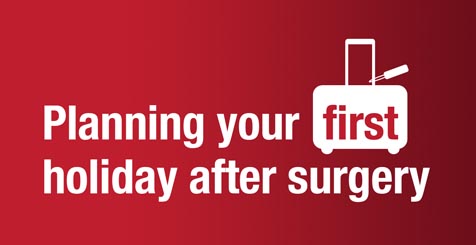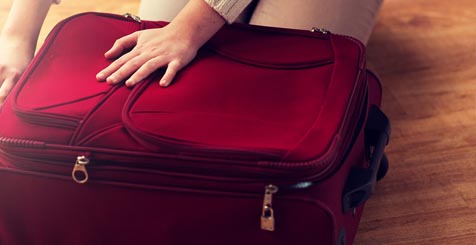Having a holiday to look forward to can be just the boost you need when you’re recovering from heart-valve replacement surgery. From choosing your destination and booking your vacation to making sure that you’ve considered your fitness level, there’s plenty to think about. If you’re wondering where to start, here are seven questions to ask when planning a holiday after heart-valve replacement surgery.
- When will I be fit to fly?
Unless you’re planning on a staycation, your holiday plans may include getting on a plane, which means that you’ll need to make sure you’re well enough to fly.
As with any major surgery, you must get medical advice on whether you’re fit to fly from your GP or surgeon. Different airlines have their own regulations on flying after surgery, and you’ll need to check the rules before you book your flight but, generally, there are no specific travel restrictions for heart-valve replacement surgery.
As a rule of thumb, the Civil Aviation Authority advises that you wait 10 days after chest surgery before flying, and 14 days after a coronary artery bypass graft. In reality, this is a minimum and you’ll probably want to wait longer than that to cope with the extra effort involved in negotiating an airport and getting through the flight with minimal stress. At three months post-surgery you may be ready to manage travelling and six months on you should be feeling well on the road to full recovery. Applying a common sense approach, if you can walk 100 metres at a brisk pace without pain or breathlessness, you should be fit enough to get on a plane.
Bear in mind that keeping the heart pumping with moderate exercise is recommended after any kind of heart surgery, so you may choose to avoid long flights that involve sitting still for hours on end. Flying after any kind of recent surgery involves an increased risk of deep vein thrombosis (DVT), too, so it’s a sensible precaution to avoid long-haul flights for 6-8 weeks after surgery. Reserve seats with extra legroom if you can, so that you can stretch your legs and wriggle your feet more easily.
Remember to be very careful carrying luggage, particularly if you’re in the relatively early stages of recovery, and don’t be tempted to haul large cases about – it’s much safer to ask for help from travelling companions or airport staff and taxi drivers.
- Can I go somewhere hot?
There’s nothing like sunshine to lift the spirits, with the welcome hit of Vitamin D that comes with it, but it makes sense to avoid extreme temperatures, especially if you’ve had surgery relatively recently. Before settling on a destination, check the typical temperature range for the time of year and be realistic about whether it could be uncomfortably hot.
Once you’re there, the usual precautions apply: stay hydrated by drinking plenty of non-alcoholic fluids, take it easy in the shade during the hottest part of the day (11am to 3pm) and make the most of a siesta so you have more energy to enjoy the cooler evenings.
- How about a trip to the mountains?
As attractive as the stunning scenery of an Alpine holiday might seem, there’s less oxygen at high altitudes, which can lead to breathlessness and angina, so mountainous regions aren’t the ideal choice for your recovery holiday. How high is too high? Well, the British Heart Foundation advises sticking to destinations that are less than 2000 metres above sea level.

- How active should I be?
It really depends on how far into your recovery you are, and how you’re feeling. Pace yourself and stick to your cardiac rehabilitation programme as closely as you can. Listening to your body and being prepared to be flexible with your itinerary will help – that four-hour coach trip to see some remote ruins may seem a lot less appealing if you’re having an off day.
- What should I eat?
In the past, you might have associated holidays with eating whatever you fancy and making the most of an all-inclusive package, including the ‘free’ bar and bottomless ice-cream freezer. Things are different now, and you’ve probably made some fairly major changes to your diet to help your recovery.
Don’t risk undoing all the effort you’ve put in so far, and check out the food that’s available before you book. Are there plenty of healthy options – maybe you can even get your meals made to order? Might you feel happier going self-catering and buying fresh local produce you can prepare yourself so you know exactly what you’re eating?
- Will I be able to get travel insurance?
Many insurance companies won’t provide travel insurance for people who have heart valve disease. But don’t worry, if you’ve had heart-valve replacement surgery some companies offer tailormade travel insurance, so shop around the specialist providers to make sure you get the best deal you can. Arranging your insurance may involve going through a medical screening session online or over the phone, so you should be ready to answer some questions.
An extra advantage of getting specialist medical travel insurance is that you’re more likely to be covered if you have to cancel your travel plans, should you become unwell before you’re due to travel. It may even be that your travel companions can also recover some of their costs, too.
Tempted to stick with standard travel insurance? Do remember that the majority of insurers have a list of conditions that are compulsory to declare, regardless of how long ago they occurred. Insurers will want to know about any conditional involvement medication, surgery or outpatient treatment, tests or investigations during the past five years. If you don’t declare any pre-existing conditions, you could invalidate your insurance altogether and be left unable to claim successfully.
- What if I feel unwell while I’m away?
Choose a destination where you know there’s good medical provision! Now is not the time to backpack across isolated terrain. Having the right travel insurance in place will give you the peace of mind of having emergency medical cover in place, should you need it, subject to your policy’s terms. When you arrive at your destination, familiarise yourself with where the local pharmacy, medical centre and hospital are located – that way, you can stop worrying and you’ll know exactly where to go if you fall ill.






